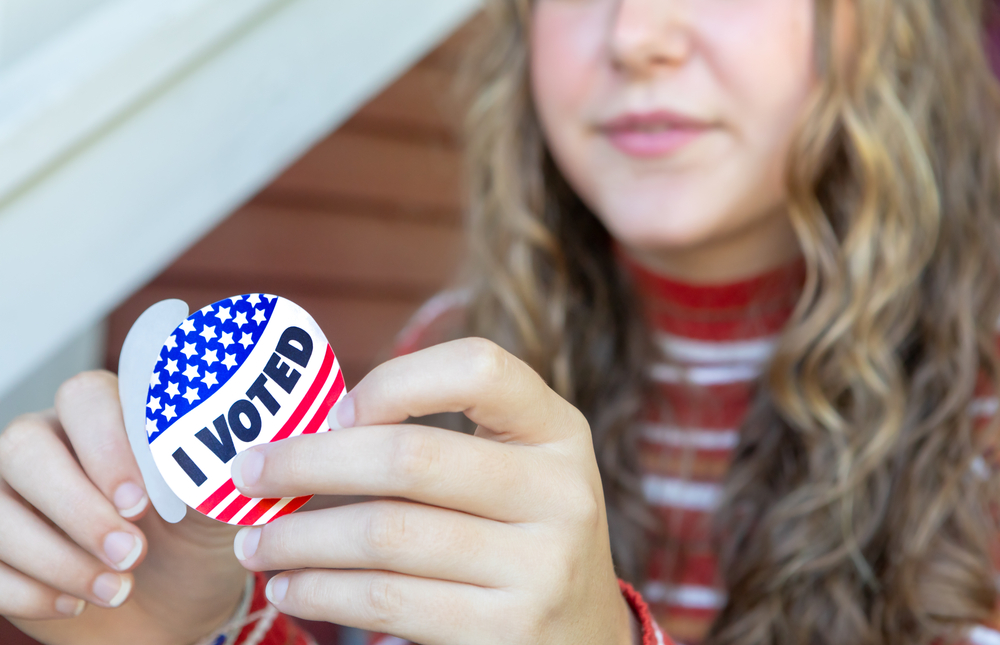
Here we are, a full week after the midterm elections took place and we still don’t know all the winners. And who owns what.
We know the Democrats have retained their majority in the Senate. The House vote to determine who ends up in power remains “too close to call.” No matter which side of the aisle you’re rooting for, there’s no question that in so many ways, this election was off the charts.
It was predicted to be a “red wave” for the Republicans, and an exercise in blood-letting for the Dems. But of course, the opposite was true. I don’t know how much “wishful thinking” enters into the polling process, but a lot of very smart people got it very wrong. One of the few who nailed it was political gadfly Michael Moore. (He was right about Trump winning in 2016, too.) But few actually predicted anything close to the eventual outcome.
That was especially the case for teens and twentysomethings – Gen Z. As the old saw goes, politicians can never count on their votes. In so many elections, they’re no-shows, unwilling to support candidates, proposals, referenda – the issues that ought to matter to them.
This year, CBS News’ Jennifer De Pinto and Anthony Salvanto reports it was “The Young & Restless” who made the difference for the Dems. Their poll predicted 60% of their votes would support Democratic candidates. In reality, it was closer to 63%.
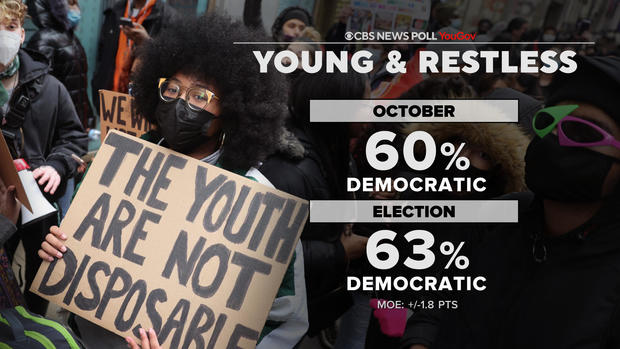
That may be why more candidates created content (ads, memes, short videos) with Gen Z in mind for the election. In a recent story in The Verge by Makena Kelly, content creation for the more than 8 million eligible new voters this year has been in high gear for months.
As we know so well, Facebook lost its fastball a long time ago, and Twitter….let’s not even go there.
But TikTok and photo app BeReal were active players in disseminating messaging and content to young voters. John Fetterman’s campaign was especially active in meme creation and distribution in Pennsylvania. So was Josh Shapiro, whose successful run for governor in that same state made wide use of BeReal.
If you believe in “meet the voters” where they are, why wouldn’t you focus your efforts on platforms that matter? Sometimes, it’s just a matter of showing up.
BeReal, Pennsylvania. 😎 https://t.co/lvrxlxm7qQ pic.twitter.com/652q2GPdBZ
— Josh Shapiro (@JoshShapiroPA) November 1, 2022
These politicians know who moves the needle and where to find them. A recent Pew Research study provided the road map. All politicians had to do was follow it.
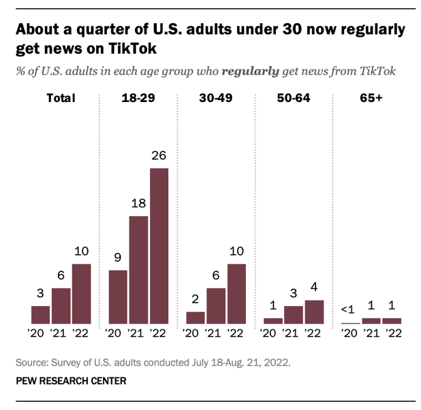
The pollsters are still trying to determine turnout among twentysomethings. One of the more reliable sources, Tufts University’s Tisch College of Civic Life peg the percentage of 18-29 year-olds who voted at about 27% – and the lion’s share went to Democratic candidates.
Ironically, that’s a much higher percentage of young people who use a radio receiver to listen to audio. An Edison study that compared 2014 to Q3 2022 revealed how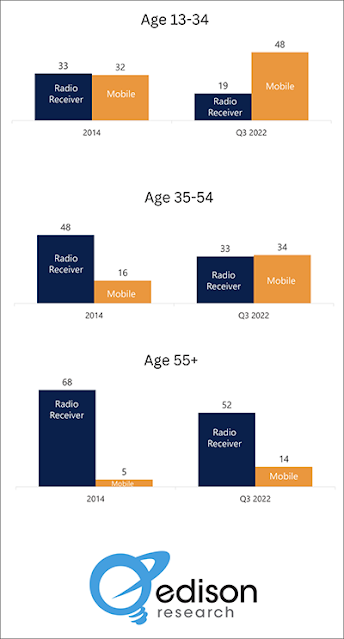 mobile has rapidly become the audio gadget of choice – no shock there.
mobile has rapidly become the audio gadget of choice – no shock there.
But as the politicians have learned in this election cycle, in particular, it’s about more than platforms and gadgets.
You have to create content that’s meaningful to them. Governor-elect Shapiro’s digital director, Annie Newman, says it’s about authenticity:
“(Young people) see these platforms, where someone has to be wholeheartedly who they are, and they’re a little bit more discerning.”
Almost none of today’s radio’s content is geared toward teens or college students. Why should they listen when there’s so much more that’s geared to them on other platforms?
Many in radio have thrown in the proverbial towel on Gen Z, figuring they’ll never use the medium when they have better options. But in spite of radio’s cold shouldering young people, many still tune in while in the car. At least for now.
 And as the politicians have learned – and in a few cases, have perfected – if you make it relevant to them, you make it matter, and you deliver content that has a ring of truth to it, they’ll give it a shot.
And as the politicians have learned – and in a few cases, have perfected – if you make it relevant to them, you make it matter, and you deliver content that has a ring of truth to it, they’ll give it a shot.
Like the rest of us, they vote with their feet…and wallets. And if they’re good enough for Josh Shapiro, Gretchen Whitmer, and Joe Biden, they should be just fine for broadcast radio, a medium that keeps losing listeners to digital media.
They also vote with their ears.
A new Edison/NPR study, “The Spoken Word Audio Report,” says Gen Z spends 214% more time with spoken word than their counterparts back in 2014. Overall, young 13-24 year-olds spend 22% of their time with spoken word audio – more than three times higher than in their earlier report from eight years ago.
That suggests research might be a wise idea in identifying content needs. There may be alternatives to K-Pop, 9th caller contests, and dated production that would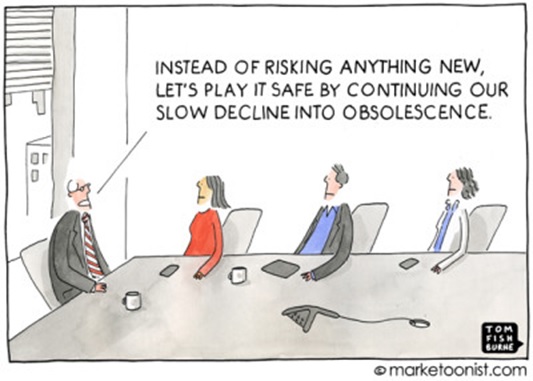 resonate with Gen Z.
resonate with Gen Z.
You don’t know until you try. And as the politicians learned, their vote counts the same as Millennials, Xers, and Boomers.
So does their spending and buying power.
Rule #1 in radio programming and content creation is to fish where the fish are.
I know a place where they’re really biting.
Special thanks to Dave Beasing who knows a little something about Gen Z.
- What To Do If Your Radio Station Goes Through A Midlife Crisis - April 25, 2025
- A 2020 Lesson?It Could All Be Gone In A Flash - April 24, 2025
- How AI Can Give Radio Personalities More…PERSONALITY - April 23, 2025




Q: Who needs younger demos just as much as radio?
A: Nielsen.
And when they find them—
They show up big in the overall ratings.
(There’s some pretty good demo fishing over at NPR).
Low cume, very high AQH:
Isn’t there an underperforming station in your cluster this equation would work for?
Your last question is THE question, Marty. I have been asking it for years, and wonder what is taking so long.
Ooohh- finding out what they want? Then giving it to them? Interesting concept. Then maybe you could market to the intended audience that the content exists. The challenge is getting the “fish” to your pond, when they may be irretrievably elsewhere.
Although, there is hope. “Yellowstone” on Paramount Plus just broke the mold for a shared viewing experience. 12 Million on the same day? I’m sure not all at once (as in ABC/NBC etc.) but there was a hunger for this content. Every broadcaster should view this as a goal…I’m just sayin’.
The “shared experience” isn’t just hurting radio, it has also diluted the music industry. Thanks, Dave.